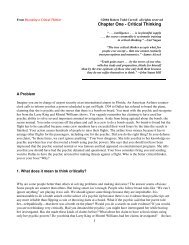A Practical Guide to Critical Thinking - The Skeptic's Dictionary
A Practical Guide to Critical Thinking - The Skeptic's Dictionary
A Practical Guide to Critical Thinking - The Skeptic's Dictionary
You also want an ePaper? Increase the reach of your titles
YUMPU automatically turns print PDFs into web optimized ePapers that Google loves.
Greg R. Haskins<br />
17<br />
Table 4<br />
Hindrances Due To<br />
Psychological and Sociological Pitfalls<br />
Hindrance Definition Example <strong>Critical</strong> <strong>Thinking</strong> Tip<br />
Ad hominem<br />
Fallacy<br />
Ad populum,<br />
Bandwagon<br />
Fallacy<br />
Communal<br />
Reinforcement<br />
Emotional<br />
Appeals<br />
Evading the<br />
Issue, Red<br />
Herring<br />
Fallacy of False<br />
Dilemma,<br />
Either/or<br />
Fallacy<br />
Irrelevant<br />
Appeal <strong>to</strong><br />
Authority<br />
Lawsuit<br />
Censorship<br />
Criticizing the person<br />
making an argument, not<br />
the argument itself.<br />
An appeal <strong>to</strong> the<br />
popularity of the claim as<br />
a reason for accepting<br />
the claim<br />
<strong>The</strong> process by which a<br />
claim, independent of its<br />
validity, becomes a<br />
strong belief through<br />
repeated assertion by<br />
members of a<br />
community.<br />
Making irrelevant<br />
emotional appeals <strong>to</strong><br />
accept a claim, since<br />
emotion often influences<br />
people more effectively<br />
than logical reasoning.<br />
If one has been accused<br />
of wrongdoing, diverting<br />
attention <strong>to</strong> an issue<br />
irrelevant <strong>to</strong> the one at<br />
hand.<br />
Intentionally restricting<br />
the number of<br />
alternatives, thereby<br />
omitting relevant<br />
alternatives from<br />
consideration.<br />
An attempt <strong>to</strong> get a<br />
controversial claim<br />
accepted on the basis of<br />
it being supporting by an<br />
admirably or respectable<br />
person<br />
Repressing free speech<br />
and critical thinking by<br />
instilling fear through the<br />
threat of lawsuits.<br />
“You should not believe a word<br />
my opponent says because he<br />
is just bitter because I am<br />
ahead in the polls.”<br />
Thousands of years ago the<br />
average person believed that<br />
the world was flat simply<br />
because most other people<br />
believed so.<br />
<strong>The</strong> communally reinforced yet<br />
mistaken belief that one can<br />
get rid of cancer simply by<br />
visualization and humor alone.<br />
Advertisements that appeal <strong>to</strong><br />
one’s vanity, pity, guilt, fear, or<br />
desire for pleasure, while<br />
providing no logical reasons <strong>to</strong><br />
support their product being<br />
better than a competi<strong>to</strong>r.<br />
<strong>The</strong> President making jokes<br />
about his own character in<br />
order <strong>to</strong> disarm his critics &<br />
evade having <strong>to</strong> defend his<br />
foreign policy.<br />
“You are either with us, or with<br />
the terrorists!”<br />
“Since the Pope thinks capital<br />
punishment is morally justified,<br />
it must be morally justified.”<br />
Journalist Andrew Skolnick<br />
was sued for his investigative<br />
reporting of Maharishi Mahesh<br />
Yogi and his Transcendental<br />
Meditation Movement.<br />
Focus on reasons & facts<br />
that support an argument,<br />
not the person making the<br />
argument. Independently<br />
verify supporting facts if<br />
the source is in question.<br />
A valid claim should be<br />
based on sound<br />
arguments, not popularity.<br />
Do not follow the crowd<br />
simply because if gives<br />
you a feeling of<br />
acceptance and emotional<br />
security. Think for<br />
yourself.<br />
If an argument requires a<br />
logical reason <strong>to</strong> support<br />
its claim, do not accept<br />
emotional appeals as<br />
sufficient evidence <strong>to</strong><br />
support it.<br />
Learn <strong>to</strong> recognize<br />
evasion, which implies a<br />
direct attempt <strong>to</strong> avoid<br />
facing an issue.<br />
Seek opposing arguments<br />
on the subject which may<br />
reveal the existence of<br />
other viable alternatives.<br />
Recognize that any appeal<br />
<strong>to</strong> authority is irrelevant <strong>to</strong><br />
providing logical grounds<br />
and facts <strong>to</strong> support an<br />
argument.<br />
If a counter-argument is<br />
not readily available, don’t<br />
assume it does not exist -<br />
it could be suppressed by<br />
special interests.






